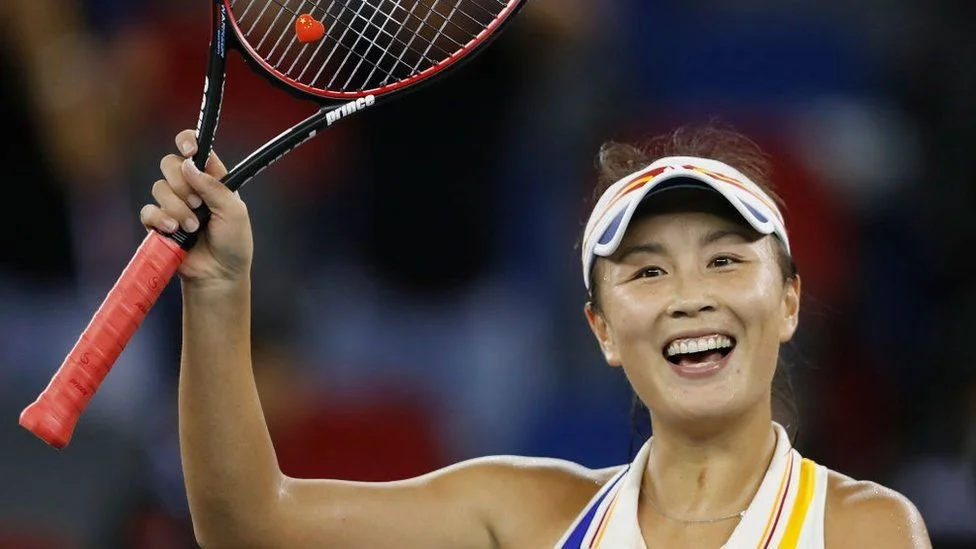EDITORIAL
The International Olympic Committee’s Role in the Censorship of Peng Shuai
Photo courtesy of BBC News.
The Olympics have long been known as a celebration of athletics that overcomes political differences between nations. For many athletes, the Olympics have provided an opportunity to speak out about political issues, both international and within their own countries. This event is celebrated as a moment of international unity, and is often the only time that people are able to freely discuss their own country. But what happens when the Olympics are conducive to the censorship that athletes are seeking to escape?
After the 2020 Olympic games in Tokyo, postponed from 2020 due to the pandemic, Chinese tennis star Peng Shuai was the center of a media scandal that involved her censorship by the Chinese government. In November of 2021, Peng Shuai made a post on the Chinese social media website Weibo, which is comparable to Twitter. This post stated that she had been sexually assaulted by Zhang Gaoli, a former prominent politician in China. This post detailed the coerced relationship between Peng Shuai and Zhang Gaoli. Peng Shuai acknowledged the fact that making this post was a great risk to her own safety and career. After minutes, the post was deleted and scrubbed from the internet. However, the post was quickly spread to social media platforms such as Twitter, a site less accessible to the Chinese government. Eventually, Peng Shuai’s name was entirely erased from Chinese internet sources. In the weeks immediately following this post, Peng Shuai was not spotted or active on social media as was previously typical for her. Even the Women’s Tennis Association was unable to reach Peng Shuai. They eventually publicly demanded that China discuss her whereabouts and threatened to stop business in China. Other prominent athletes including Roger Federer and Naomi Osaka joined in on calling out Chinese government officials and demanding confirmation of Peng Shuai’s safety. The situation erupted, causing the International Olympic Committee (IOC) to become involved.
China, set to host the 2022 Winter Olympics in Beijing, could not ignore this for long with the world’s eyes on them. After their enduring silence, the Chinese government eventually posted an email on Western social media platforms that claimed to be coming from Peng Shuai, but it was immediately discovered that this email was actually written by a member of the Chinese government. The email states that the sexual allegations were false and that Shuai is safe and acting on her own free will.
Photo courtesy of The Guardian.
But the public’s concern was ongoing and growing. Eventually, photos were publicized of Peng Shuai in a video call with the president of the International Olympic Committee. No transcript or footage was released, but the overall message of the post relayed that Peng Shuai is in fact okay and would like privacy. Despite all of these attempts at making Peng Shuai seem as though she is acting independently, the fact that she was never seen in public or allowed to speak without the supervision of a government official made it clear that she was not being allowed to speak freely against her sexual assault. At this point, the Women’s Tennis Association has announced the suspension of all tournaments in China and Hong Kong until there is meaningful evidence that Peng Shuai is able to speak freely. This poses a threat to both China and the organizations that profit from tennis tournaments in China and also puts pressure on the Chinese government to provide substantial answers to the people engaged in the scandal. The International Olympic Committee, on the other hand, aided China’s attempts to present Peng Shuai as acting under her independent will. This was due to the fact that the Winter Olympics were set to take place in China mere months after this incident. The Olympic committee was not in the financial position to give the Chinese government any reason to not allow the Olympics to take place.
Since these events have taken place, Peng Shuai has still not been able to speak freely on any platform, and the Chinese government has faced very little repercussions for their censorship. The 2022 Olympics took place as scheduled and brought in massive revenue for China, with the International Olympic Committee doing nothing to aid in the situation. In Peng Shuai’s situation, the International Olympic Committee was presented with the opportunity to ensure justice, but this was not achieved. From a business standpoint, the decision to aid in the censorship of Peng Shuai is logical, but the IOC did aid in the silencing of a woman speaking out against sexual assault. The job of the International Olympic Committee is to put on the Olympics. After the postponement of the 2020 Olympics due to the pandemic, they were unrelenting in making sure the Olympics took place. However, with the Olympics set as one of the world’s largest unifying events, questions of ethics and justice are impossible to ignore, just as is the IOC’s involvement in the censorship of Peng Shuai.


